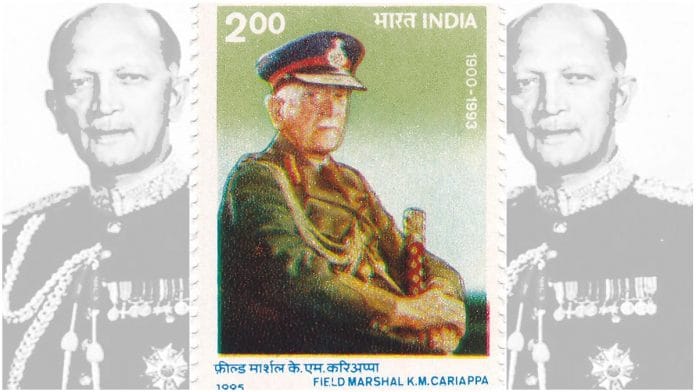New Delhi: Field Marshal Kodandera Madappa Cariappa was the first Indian commander-in-chief of the Indian Army, taking over from British General Roy Butcher on 15 January 1949.
However, Cariappa’s legacy goes far beyond being the first Indian to lead the Army or even being one of only two five-star Army generals (being awarded the Field Marshal rank). He is also remembered for keeping it away from politics, and ensuring inclusivity by doing away with caste, creed and other barriers for recruitment, by raising the Brigade of The Guards, a mechanised infantry regiment, in 1949.
Before becoming Army chief, Cariappa had led the Indian forces on the western front during the India-Pakistan War of 1947, and played a crucial role in recapturing Zojila, Drass and Kargil.
Military historian and national security analyst Mandeep Singh Bajwa said of Cariappa: “He accepted pay and ration cuts for the forces because he felt that it would help the cause of nation building.”
Field Marshal Cariappa died in Bangalore (as it then was) in 1993 at the age of 94, and since then, there have been demands to award him the Bharat Ratna, which have received backing from India’s first Chief of Defence Staff, Gen. Bipin Rawat.
On his 27th death anniversary, ThePrint recalls one of the times Cariappa showed he was a man of principles who viewed all soldiers as his sons.
Also read: Sam Manekshaw, the general who told Indira when Indian Army wasn’t ready for a war
A son’s story
On the last day of 1965 war between Indian and Pakistan, then 36-year-old Squadron Leader K.C. Cariappa of the Indian Air Force was flying near the border when he was shot down. A few moments later, he was taken prisoner by the Pakistan Army.
During interrogation, K.C. Cariappa only revealed his name, rank and unit number. However, an hour later, jail guards rushed into his cell to inquire whether he was the son of K.M. Cariappa, then a retired general (he was conferred the rank of Field Marshal in 1986).
K.C. Cariappa recalled: “As per standard procedures, I rather parrot-like gave my name, rank and number. It was then that I was asked if I was related to General Cariappa. I feigned a faint because of the pain, or maybe I did pass out. The next thing I knew was that I was lying on a litter in the back of a jeep and was being questioned by a Brigadier.”
After K.C. Cariappa confirmed that he was the son of General Cariappa, General Ayub Khan, the military leader of Pakistan, announced on the radio that K.C. Cariappa had been captured by his forces and that he was safe in their custody. Khan offered to release Cariappa junior because he was the son of K.M. Cariappa, and ordered Pakistan’s High Commissioner in New Delhi to personally meet the retired general and brief him about his son’s health.
However, General Cariappa declined this offer. He told Khan that all the captured Indian soldiers were his sons, and all of them should be looked after by Pakistan.
Years after his release, K.C. Cariappa revealed: “My dad was a man of high principles. For him, his son and all other soldiers were the same. Even though Ayub Khan was his junior and was close to him, he refused to get me released before the others. I was later released with all others.”







Very true, Preet Pal ji !et him be at ut. It us better than flooding us with readings like ‘ Govt does this good thing, BUT fails in this thing ‘ kind of negative repirting in the bane of investigative journalism!
रोम जल रहा था और नीरो बांसुरी बजा रहा था
शेखर गुप्ता जी आप भी वही कर रहे हो.